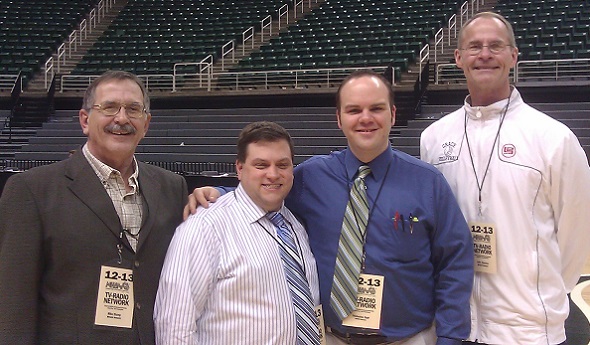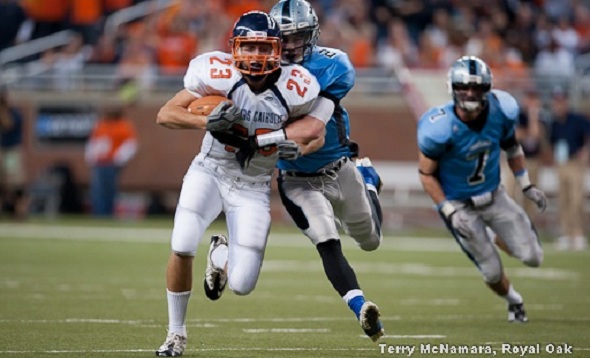
MHSAA Gets Word In During Video Age
September 3, 2014
By Rob Kaminski
MHSAA benchmarks editor
The Buggles’ leadoff single for MTV’s Opening Day on Aug. 1, 1981, started a rally – OK, a revolution – in the music industry that would last decades.
“Video Killed the Radio Star” certainly had a lasting impact, and the song and its one-hit-wonder artist are now an intertwined answer in music trivia lore.
But, the game is still going on. The radio star is far from dead, and, in fact, MTV rarely shows music videos any more.
True, video is everywhere, from laptops to tablets to phones. So, too, is music – and the spoken word in the form of podcasts, audiobooks, and, yes, play-by-play of athletic events.
The MHSAA Network has been providing the latter for prep enthusiasts for decades, entering the world of webcasting around the turn of the millennium.
Having broadcasts available online has done wonders to increase the number of stations and listeners. Prior to the foray into internet broadcasts, dedicated ISDN phone lines and a satellite were required for content to reach the network affiliates.
John Kreger, the primary voice of MHSAA Championships, has been there through the transition, and sees only a bright future ahead.
Prior to the 2003-04 school year, the MHSAA entered a partnership with TBC Sports to air its radio broadcasts for tournaments. Working with TBC owner Will Tieman at that time was Kreger.
“This was before the Network was online, and Will said to me, ‘Hey John, I have a project for you,’” Kreger recalls. “Well, I jumped at the opportunity and he let me run with it. There are times I still want to pinch myself to make sure I’m really able to watch and broadcast all these events.”
After four years with TBC, the MHSAA Network moved its operations to online vendor EZStream, allowing for greater growth and easier access for all involved.
“EZStream really stepped up its quality in recent years, and once our stations no longer needed a satellite receiver, getting games on the air became much simpler,” Kreger said. “All they need to do is point and click to get the feed. It’s a low-cost – almost no-cost – way for stations around the state to tell the story of high school sports.”
No one enjoys telling that story more than Kreger, now in his 11th year calling MHSAA events. His broadcast career has placed him on radio row at Stanley Cup, NBA and MLB playoffs, but it’s talking about his MHSAA Tournament gig that revs his voice to a pitch normally reserved for the final seconds of a prep title game at Ford Field, Breslin or Compuware.
“High school sports is the only pure form of sports left. As a professional reporter and broadcaster I spend most of my year dealing with playing time and sneaker deals,” Kreger said. “But for nine weeks out of the year I get to broadcast sports which the MHSAA has made into a showcase about students, and I am honored to do this. The looks on those kids’ faces when they take the same court or field they see on TV, knowing they reached the pinnacle, there’s no rush like it in sports. I’ll take high school events every day of the week and twice on Sunday.”
The 2008 MHSAA Ice Hockey Final seemed like it might indeed push Kreger into action on a Sunday. The last game of the weekend, the Division 1 tilt between Marquette and Orchard Lake St. Mary’s, went eight overtimes before it was declared a tie. It was one of Kreger’s most memorable moments.
“It was our first year doing hockey on the Network, and being on the air, just being a small part of that, and seeing the MHSAA make the right call and declare a tie; it is something I’ll never forget,” Kreger said. “I’ve been on air enough to hear the cliché, ‘What a great game; too bad someone had to lose,’ too many times, or at times where that might not have been the case. Well, no one deserved to lose that night, and the MHSAA made a great decision. I’m proud to have seen that.”
Thanks to Kreger and the Network, thousands of people continue to “see” games they can’t attend. For the 2014 winter season, approximately 7,000 unique listeners tuned in to the MHSAA Ice Hockey, Girls Basketball and Boys Basketball Finals.
Audio continues to thrive and serve its audiences for a number of reasons.
“Personally, one of the reasons I stay with audio is because we have the opportunity to tell a story and allow the listener to create their own picture,” Kreger said. “Radio broadcasts are much more descriptive, whereas TV broadcasts serve more as guides to what people are already seeing.
“One of my idols is Ernie Harwell, who said, ‘In radio, nothing happens until the broadcaster says it does.’ In that respect, there’s more anticipation and imagination for the listener. Think of the iconic moments like the Bobby Thompson home run. It’s always the radio feed. It takes people back to where they were at the moment.”
That’s another key advantage to audio. If people can’t attend an event, they can listen. Even in today’s world of hand-held video devices, there are times when listening is simply more conducive than watching, whether working around the house, exercising or driving to and from appointments.
“Radio is a lot more accessible to people. It’s a constant companion, and that’s the beauty of it,” Kreger said.
Like its video brethren, audio listeners are turning to mobile devices as the tool of choice. Of the 7,000 customers this past winter, nearly one-third were mobile listeners.
Kreger has been an amiable companion for Michigan prep enthusiasts for the past decade, and he hopes they keep inviting him along wherever their travels take them. He also lauds the MHSAA for expanding its menu.
“The MHSAA is to be commended for expanding the schedule to more than just football and basketball,” Kreger said. “The more sports we can bring to people, the better.”
If Kreger could be in two places at once, there’s no doubt he’d accept the assignment as long as it had the MHSAA stamp on it. Perhaps that’s because his values and perspective are so closely aligned with the mission of school sports and the MHSAA.
“The first rule of high school sports is that this isn’t life. It’s part of life,” he said. “The athletes will become doctors, lawyers and teachers. The coaches are teachers, doctors and auto workers. We don’t sugar coat. I try to be true to the game, to be honest and accurate, and all the while I remember perspective. Above all else, I try to remain respectful of the game.”
PHOTO: The faces behind some of the familiar voices on the MHSAA Network are, from left, Mike Stump, John Kreger, Denny Kapp and John Spooner.

Division 5 Final: Powers Up
December 20, 2011
DETROIT – The final night of September was cold, wet and especially disappointing for Flint Powers Catholic.
Chargers coach Bob Buckel sensed that frustration as the bus rolled to to a stop after 6-0 loss and then silent ride home from Davison. Powers already was 2-3 heading into that game and needing to win out to guarantee a playoff spot. Now at 2-4, perfection the rest of the way was absolutely necessary to catch even the slimmest of shots at a postseason berth.
The last eight games became unofficial playoff games for the Chargers. And they won them all.
Unranked and the underdog, Powers downed No. 1 Lansing Catholic in record-setting fashion Saturday, 56-26 to claim the MHSAA Division 5 championship at Ford Field.
“We knew that we had to win out. Nobody shied to that competition,” Powers senior lineman Danny O’Brien said. “We really got after it.”
And especially Saturday. The 56 points tied Saginaw Nouvel’s from the Division 7 Final earlier in the day as the new MHSAA Finals record. They also were the most points Powers has ever scored, beginning with its first season in 1970.
Lansing Catholic senior quarterback Cooper Rush was named Division 5-6 Player of the Year earlier this week by The Associated Press, and his name can be found all over the MHSAA record book. He added 291 yards and three touchdowns passing, and another score rushing to his impressive three-year varsity career totals.
But Saturday it was Powers junior quarterback Garrett Pougnet who played his name into history.
Rewind 12 weeks ago. Lansing Catholic (13-1) beat Powers 37-17. Pougnet struggled, completing just 6 of 20 passes and running for 67 yards and a score.
His performance in the Final was one of the many differences in the rematch. This time, Pougnet was 12 of 15 passing for 258 yards and four touchdowns, and also ran 14 times for 159 yards and two scores. His 413 yards of total offense were second in MHSAA Finals history and just 13 off the record.
Buckel listed the other differences this time around: Heading into the teams’ Sept. 2 meeting, Powers (10-4) was coming off a big loss to Saginaw Nouvel and two players were out with concussions. Two more defensive backs were still playing on the junior varsity. And, of course, he used a few different formations in the rematch.
“I just said, when we get the ball, we’re going to be very aggressive,” Buckel said. “We had a play we put in this week called Ford Field. It didn’t work either time. But we just wanted to be aggressive because we really thought we might need to score 50 points to beat them, because nobody has slowed them down.”
Rush finished this season with 4,005 passing yards, good for second in the MHSAA record book for one season, and 48 passing touchdowns, which tops that list. This time, senior Connor Bartlett was the main recipient with 11 catches for 189 yards and two scores. Senior Matt Macksood also caught a touchdown pass, and finished this season with 95 catches (second for one season) for 1,590 yards (fifth) and 22 touchdowns (tied for second).
“We moved the ball pretty good when we had it on offense. We just didn’t have it. I think they scored just about every time they had the ball,” Lansing Catholic coach Jim Ahern said. “The big difference in the games where we came back – we came back from 21 down against Portland, which was a very good football team – was we got some defensive stops. We just didn’t get them tonight.”

